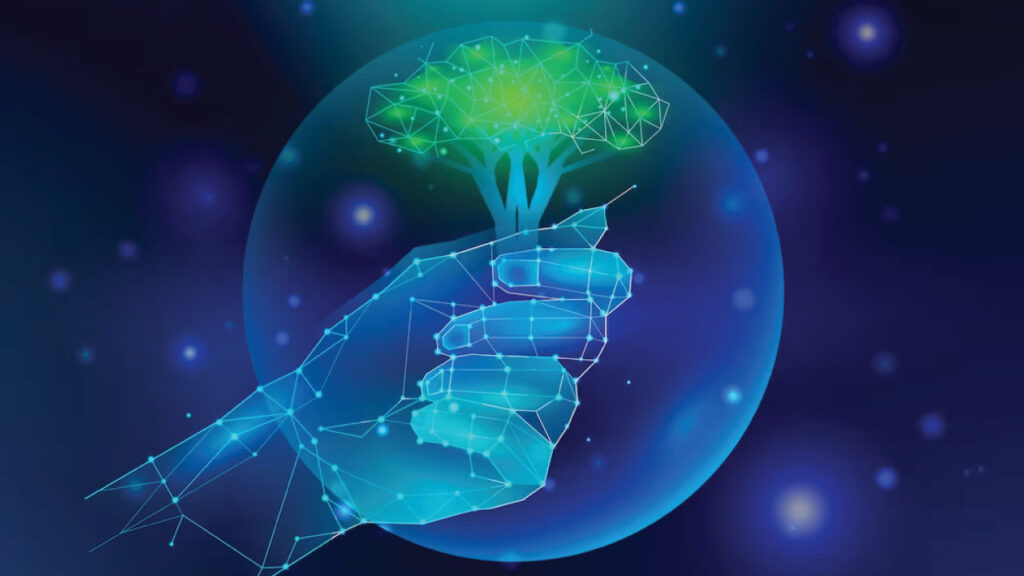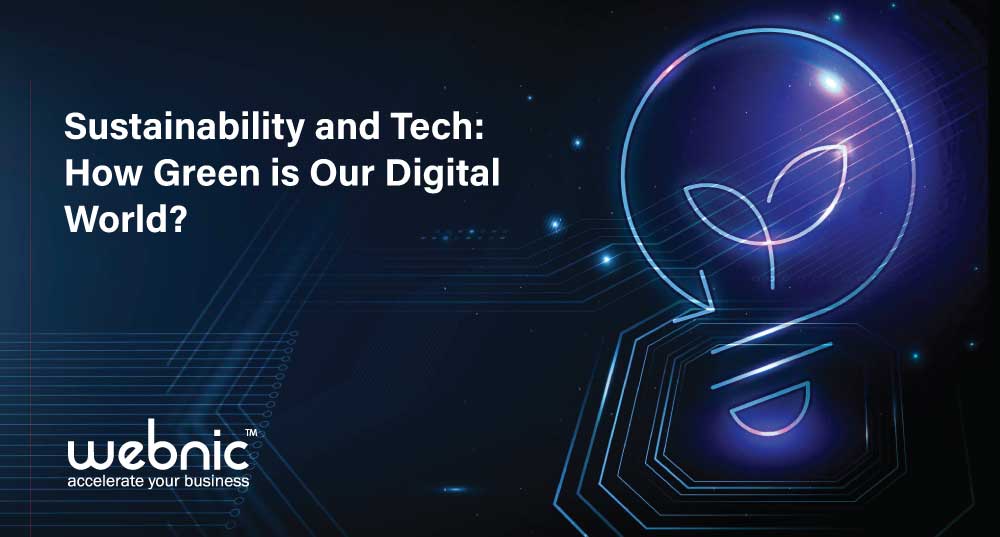In today’s fast-paced digital age, the words ‘sustainability’ and ‘technology’ resonate more than ever. As constant innovations and digital advancements surround us, one cannot help but ponder: How sustainable is this rapid digital expansion? The impact of our technological activities on the environment is profound, leading many to question the actual cost of our digital convenience. Delving deeper into this matter, we uncover the complex relationship between the tech world and its footprint on our planet and the pioneering efforts underway to move the industry toward a greener future.

Digital Carbon Footprint: The Unseen Culprit
Surprising Contributor: Digital activities we often take for granted, such as streaming videos, sharing photos or sending emails, have an inherent environmental impact.
Global Energy Consumption: It may be a shock, but data centres worldwide consume approximately 2% of global electricity. This is significant, especially considering other major industries and household uses.
The Growing Threat of Electronic Waste
Staggering quantity: 50 million tons of electronic waste are generated annually worldwide. To put this into perspective, that’s the equivalent of throwing away 1000 laptops every second.
Lack of recycling: What is more troubling is that only a fraction of this e-waste – around 20% – undergoes proper recycling.
The Domino Effect: Improper disposal of these electronic items doesn’t just end in waste. This leads to various environmental issues, from the leaching of hazardous materials into the soil to the contamination of water sources.

Green Initiatives in the Digital Realm: Paving the Way to a Sustainable Future
1. The rise of energy-efficient data centres
Tech giants are leading the change: Companies like Google and Apple are not only innovation leaders but also moving towards stability.
Google’s Green Pledge: Going beyond mere promises, Google has announced that they have transitioned 100% of their global operations to renewable energy. This means that every digital search or use of Google Maps is powered by green energy.
Apple’s ongoing efforts: Since 2013, Apple’s data centres have been a champion of green energy, with a commitment to 100% renewable energy. Their actions send a powerful message to industries worldwide about the potential of renewable energy.
2. The Advent of Green Web Hosting
A New Hosting Ethos: Many innovative companies have adopted green web hosting to counteract the environmental impact of hosting websites.
How it works: These providers have a unique approach: for every unit of electricity they draw from the grid, they invest an equal or more tremendous amount in renewable energy sources. Such initiatives not only offset their carbon footprint; They often go out of their way to positively contribute to the environment.
3. Campaign to Minimize E-waste
Sustainable Electronics: As concerns grow about electronic waste, industry attention is shifting toward producing sustainable, sustainable gadgets.
Durability and upgradeability: The approach is simple yet effective – equipment that not only has a long lifespan but can also be easily upgraded, thereby preventing repeated disposal of old equipment.
Recycling innovation: Additionally, many tech companies are exploring using recyclable or biodegradable materials to ensure that when a device reaches the end of its life, it leaves a minimal impact on the planet.

Steps We Can Take: Charting a Greener Digital Path
As our world becomes increasingly digital, it has become imperative for both individuals and businesses to add sustainability to their digital habits. Addressing the environmental impact of our online footprint is no longer optional – it is a necessity. Here’s a detailed guide to choosing an ecologically more responsible option:
1. Prioritizing Durable Equipment
Informed Purchase: The next time you are tempted by the allure of a shiny new gadget, take a moment to consider it. Instead of buying the latest appliance on a whim, look for machines with negligible environmental impact. It is not just about the device’s functionality but about its lifecycle.
Brand Transparency: Thankfully, many leading tech brands are increasingly open about their eco-friendly strategies. They highlight their efforts to reduce environmental harm from material sourcing to production processes. Always do your research and support those leading the change.
2. Adopt Cloud Services Judiciously
Beyond Functionality: While a cloud service’s efficiency and security are paramount, its commitment to sustainability is equally important. When choosing a cloud provider, don’t just consider its features. Dive deep into its energy sources.
Renewables Commitment: Many leading cloud providers are proud of their transition to renewable energy. By choosing them, you store data and actively promote a greener digital landscape.
3. Effective E-waste Management
Understanding E-waste: Every discarded phone or laptop contributes to the growing e-waste challenge. It is essential to understand the environmental impacts of improperly disposed electronic equipment.
Recycling and Disposal: Before tossing old gadgets away, learn about e-waste recycling programs near you. Many municipalities and private entities provide unique drop-off points, ensuring that equipment is recycled or disposed of responsibly.
Conclusion: Bridging the Digital and the Physical
In the grand tapestry of our modern existence, the lines between our digital domain and the tangible world are becoming more blurred daily. The rapid development of technology brings with it remarkable conveniences and transformative power. However, as we stand on the cusp of even more tremendous technological leaps, the responsibility of bringing sustainability to every digital advance becomes paramount. We can no longer see the digital realm separate from our Earth; Their destinies are inextricably linked. Only through a concerted, collaborative effort from tech giants to individual users can we ensure that the booming digital age is in harmony with the well-being of our planet. Together, we have the potential to create a future where our digital innovations not only empower humanity but also elevate the essence of global sustainability.

Akshay Tyagi is a professional content writer at Netclubbed, a prominent web development company known for its digital marketing and eCommerce development expertise. He continually gives insights that help manage the continually evolving digital environment, especially his talent for converting difficult ideas into compelling stories.

Akshay Tyagi is a professional content writer at Netclubbed, a prominent web development company known for its digital marketing and eCommerce development expertise. He continually gives insights that help manage the continually evolving digital environment, especially his talent for converting difficult ideas into compelling stories.

